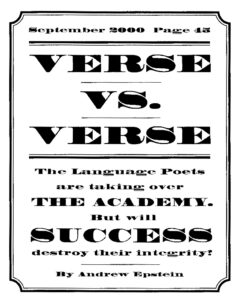Twenty years on, it is timely to reread the kind of discourse—or brazen publicity—that was circulated about Language writing and the academy, and indeed the entire project of poetics that was imagined as their synthesis, about 2000. In the two decades that followed, everything has changed in terms of the “horizon of expectation” that led to this premature discussion of the dominance of Language writing in the academy; in 2020, I will say confidently from my experience, and what I know of others’, that such a thing never happened. Perhaps it was meant not to happen, and the provocative title page to the September 2000 article in Lingua Franca by Andrew Epstein may be the reason why. As I work through my archive, I am finding numerous such signposts to futurity that did not arrive, while at the time I was caught up in the process, let us charitably say, of negotiating the “stakes at the table” of the future of Language writing. Why this discourse was misdirected, and for whose interests, will be the substance of my reading below; those interested may find, in the interest of time travel, the full text of the article here. … More
Entries published at 09/26/2020
Reflective sandboxing of software code within a machine built to parse it is seen in the case of a computer language like Java which must be compiled and then run as bytecode inside a special runtime environment, or, as with the language C, compiled and then run as “native” machine instructions, or with a simple mark-up language like HTML the specifications for which must be entirely designed into any browser destined to interpret and display it, or also with other interpreted code such as a three-dimensional model whose mathematical values for vertices and textures must be transcoded according to the rules of a given data format and given style of visual projection.
—Alexander Galloway, The Interface Effect (65)
The distinction between code as executable and language as interpretable has a basic horizon in the question of new meaning. Machinic encoding is not capable of making new meaning—only humans are. But caught in the web of mediated processes (as above), humans often fail to recognize the new—or attempt to transcode it in terms of earlier structures of interpretation. The example of the “failed mail art piece” will illustrate this. … More













